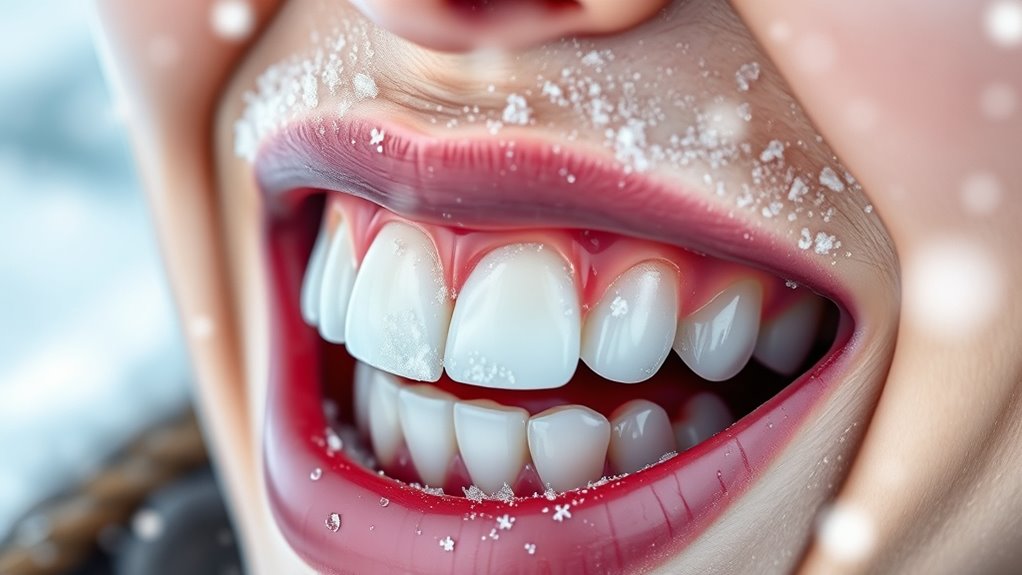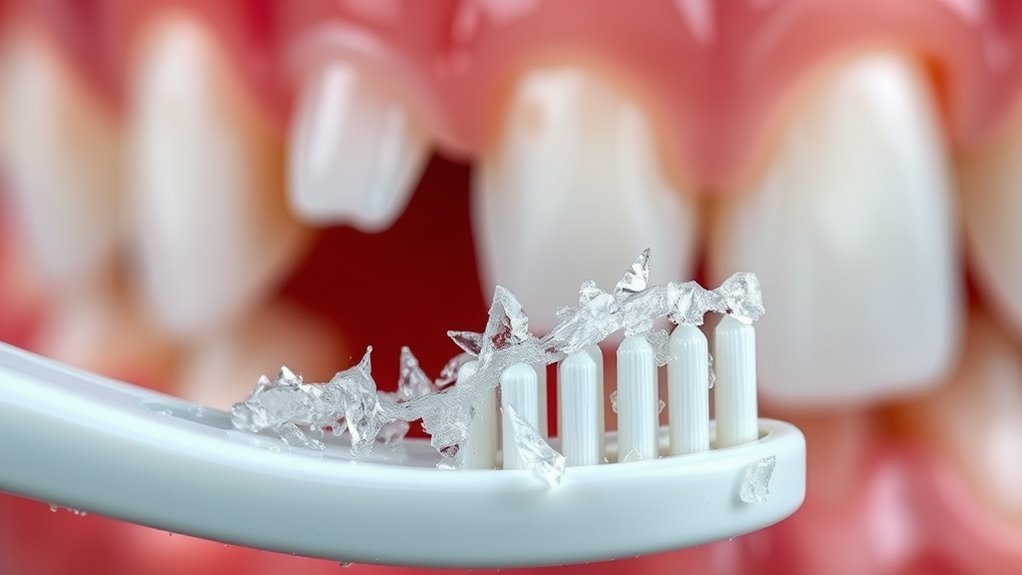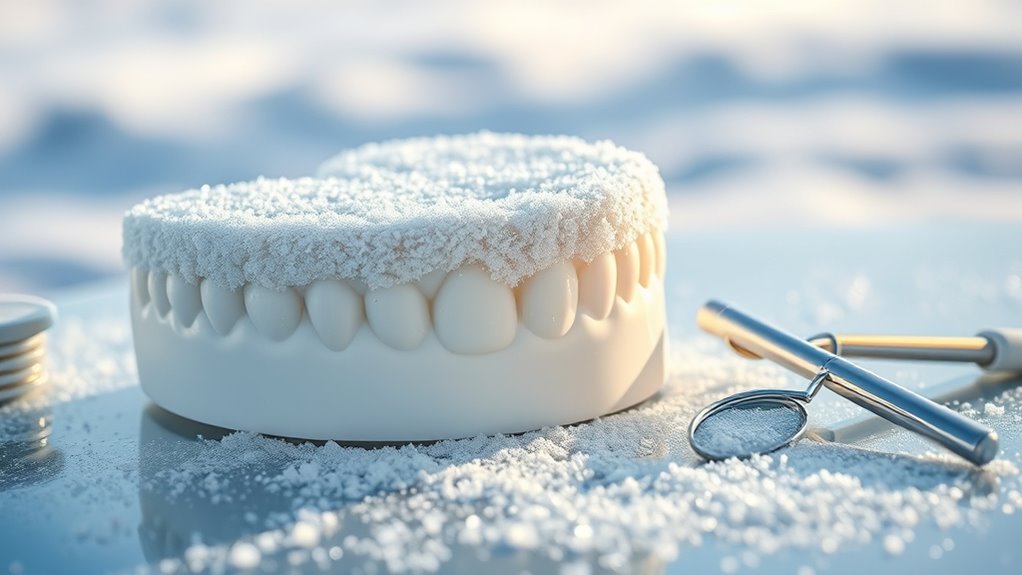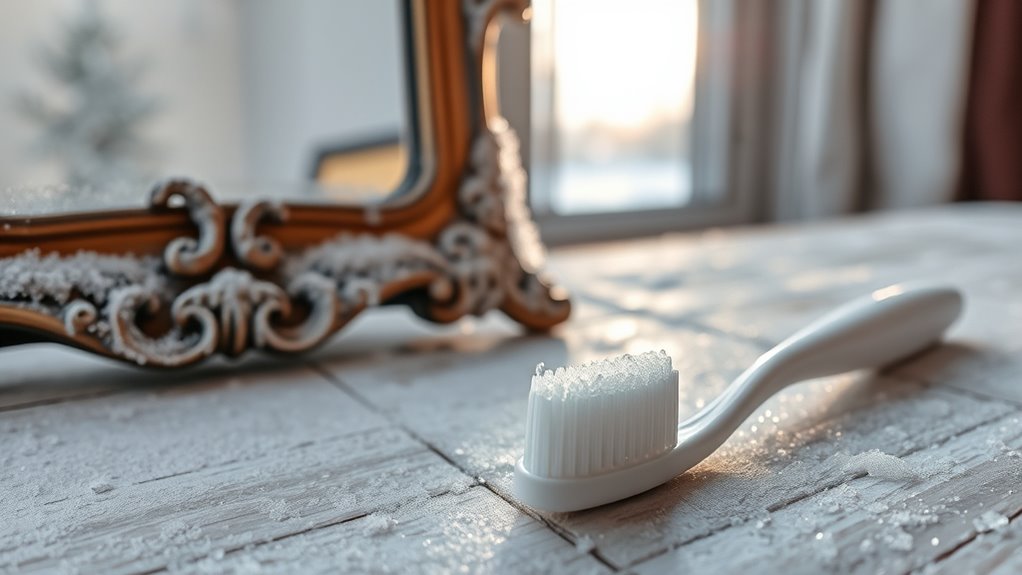First frost doesn’t directly harm your teeth; it mostly reveals underlying issues like sensitivity or gum recession. Cold temperatures can worsen discomfort and make enamel more vulnerable over time but don’t cause permanent damage by freezing. You might experience increased sensitivity or gum issues, especially if your oral health isn’t well-maintained. Protect your smile with good habits and regular care. To uncover the facts behind frost’s true effects on your teeth, keep exploring these key points.
Key Takeaways
- Frost does not directly damage teeth; it mainly reveals underlying issues like enamel erosion or gum recession.
- Cold weather does not freeze or crack enamel; teeth are protected by saliva and soft tissues.
- Prolonged exposure to frost can weaken enamel over time but does not cause immediate damage.
- Proper oral hygiene and regular dental visits are essential to prevent cold-related enamel and gum issues.
- Maintaining overall oral health and protecting teeth from extreme cold exposure are key to avoiding frost-related dental problems.
Does Cold Weather Cause Tooth Sensitivity?

Cold weather often triggers tooth sensitivity, leaving many people wondering if the cold itself is the culprit. In reality, cold temperatures can heighten dental sensitivity, causing you to feel sharp, brief pain when consuming cold foods or drinks. This increased oral discomfort happens because exposed dentin or weakened enamel lets cold stimuli reach the nerves inside your teeth more easily. If you already have dental sensitivity, cold weather can intensify the sensation, making everyday activities uncomfortable. However, cold weather alone doesn’t directly damage your teeth; it simply reveals underlying issues like enamel erosion or gum recession. Using specialized toothpaste formulated for sensitive teeth can help reduce this discomfort. Recognizing the link between cold weather and dental sensitivity helps you better manage oral discomfort during winter months.
Can Frost Damage Tooth Enamel?

You might wonder if freezing temperatures can harm your tooth enamel. While cold can make teeth more sensitive, actual frost damage to enamel is unlikely under normal conditions. However, understanding how extreme cold affects vulnerable enamel can help you protect your smile during chilly weather. Using essential oils for oral health, such as tea tree or peppermint oils, should be done cautiously and with proper dilution to avoid irritation or damage.
Cold Temperatures and Enamel
While frost itself doesn’t directly damage tooth enamel, exposing your teeth to extremely cold temperatures can cause discomfort and potential harm. Cold weather can lead to enamel erosion over time, especially if you frequently bite into icy foods or drinks. This erosion weakens the enamel, making your teeth more susceptible to sensitivity and damage. You might notice increased tooth sensitivity when consuming hot, cold, or sweet foods during winter. Although frost doesn’t freeze or crack your enamel directly, prolonged exposure to cold can accelerate enamel wear. To protect your teeth, avoid biting into ice and limit exposure to very cold environments. Maintaining good oral hygiene and visiting your dentist regularly can also help prevent enamel erosion and reduce tooth sensitivity caused by cold temperatures. Understanding enamel erosion can help you take proactive steps to safeguard your dental health.
Is Tooth Freezing Possible?
Although frost itself can’t freeze or crack your tooth enamel, extreme cold exposure can still cause indirect damage. When your mouth is exposed to very low temperatures, your oral temperature regulation struggles to keep your tissues warm, increasing the risk of frostbite prevention issues. This can lead to numbness or tissue damage in the mouth, but not actual freezing of the enamel. Teeth are highly resistant to freezing because they are surrounded by saliva and soft tissues that protect them from extreme cold. While cold weather may cause discomfort or sensitivity, it doesn’t directly freeze your teeth like water turning to ice. Instead, focus on maintaining a healthy oral temperature regulation to prevent frostbite-like symptoms and protect your overall oral health during cold weather. Proper temperature regulation plays a crucial role in safeguarding oral tissues from cold-related harm.
Enamel Vulnerability During Frost
Frost itself cannot directly damage your tooth enamel, but exposure to cold temperatures can make the enamel more vulnerable to other risks. When you’re outside in freezing weather, the frost impact on your body causes your teeth to contract slightly. This contraction can lead to microcracks or enamel erosion over time, especially if you frequently experience extreme cold. Cold temperatures can weaken the enamel’s protective layer, making it more susceptible to acid attacks from sugary or acidic foods and drinks. Additionally, protective styling benefits from certain dental habits and habits can help maintain enamel health during winter months. While frost doesn’t directly cause enamel erosion, the increased vulnerability means your teeth are at higher risk of damage if proper oral hygiene isn’t maintained. Protecting your teeth during cold weather is essential to prevent long-term enamel deterioration.
Is Gum Recession More Likely During Winter?

During winter, cold weather can increase gum sensitivity, making recession more noticeable. You might also notice that your gums react differently to seasonal changes, which can affect their health. Paying extra attention to your winter oral care routine helps protect your gums during the colder months. Additionally, being aware of AI safety measures can help ensure that health-related technologies used in dentistry remain trustworthy and secure.
Cold Weather Effects
Cold weather can increase the risk of gum recession because exposure to low temperatures often causes your gums to become more sensitive and prone to damage. When it’s cold, your gums may tighten and become less flexible, making them susceptible to frost fractures—small cracks that can expose root surfaces. This can lead to increased sensitivity and contribute to recession over time. Additionally, winter whitening treatments, which some people pursue to brighten their smile, can sometimes weaken enamel, making gums more vulnerable in cold conditions. To protect your oral health during winter, avoid sudden temperature changes and stay warm. Maintaining good oral hygiene, staying hydrated, and visiting your dentist regularly can help prevent damage caused by cold weather. Understanding hackathons can also provide innovative approaches to addressing health concerns, including dental health.
Seasonal Gum Sensitivity
As winter approaches, your gums may become more sensitive and prone to recession, especially if you’re not taking extra precautions. Humidity fluctuations can dry out your mouth, weakening gum tissue and increasing recession risk. Seasonal allergies also contribute by causing nasal congestion, which can lead to mouth breathing, further drying out your gums. This dryness makes your gum tissue less resilient and more vulnerable to irritation and recession. Additionally, increased sensitivity during colder months might make you more aware of gum discomfort or bleeding. To protect your oral health, stay hydrated, manage allergies effectively, and avoid overly aggressive brushing. Incorporating hydrotherapy techniques such as warm water rinses can also soothe inflamed gums and promote healing. Recognizing these seasonal changes can help you prevent gum recession and maintain healthier gums throughout winter.
Winter Oral Care
Gum recession can become more likely in winter due to the combined effects of dry air and increased mouth breathing. Cold air often dries out your mouth, reducing saliva flow that protects your gums. Additionally, medication side effects like dry mouth can worsen this condition. To maintain ideal oral health:
- Stay hydrated and use a humidifier indoors
- Avoid excessive alcohol and caffeine, which can dry out your mouth
- Consider oral health supplements, like vitamin C, to support gum tissue
- Be gentle with brushing and flossing to prevent damaging sensitive gums
Regular dental checkups help catch recession early. Remember, winter’s harsh conditions demand extra care to prevent gum recession and keep your mouth healthy.
Does Reduced Sunlight Affect Oral Vitamin D Levels?

Reduced sunlight during the colder months can considerably impact your body’s production of vitamin D, which is essential for maintaining healthy oral tissues. When you experience sunlight deficiency, your skin produces less vitamin D, increasing the risk of vitamin D deficiency overall. This deficiency can weaken your immune response and affect your oral health, leading to issues like gum disease and delayed healing. Since vitamin D helps your body absorb calcium, insufficient levels may also compromise the strength of your teeth and jawbone. During winter, shorter days and less sun exposure make it harder to maintain ideal vitamin D levels naturally. Additionally, robotics integration in healthcare settings could improve diagnosis and treatment options for vitamin D deficiency-related conditions. To counteract this, you might need to rely on diet, supplements, or safe sun exposure to prevent vitamin D deficiency and protect your oral health.
Are Colds and Flu Linked to Oral Health Issues?

When you catch a cold or flu, these illnesses can do more than just make you feel miserable—they can also impact your oral health. Illness-related symptoms like fever, congestion, and dehydration can lead to issues such as dry mouth, increasing your risk of cavities and gum problems. If you’re into winter sports, you might experience oral dehydration from dry, cold air, which worsens oral dryness. Additionally, frequent coughing can erode enamel and irritate gums. Poor oral hygiene during illness can allow bacteria to thrive, leading to bad breath and infections. To protect your oral health, stay hydrated, practice good oral hygiene, and be mindful of symptoms that could signal emerging dental issues. Remember, maintaining oral health is vital, even during cold and flu season. Incorporating electric bikes for transportation during winter can reduce exposure to cold air and help maintain overall health.
Does Cold Impact the Effectiveness of Dental Treatments?

Cold temperatures can influence how well dental treatments work, especially during winter months when you’re more prone to colds and dry air. The cold impact on dental procedures varies depending on the treatment type. For example, fillings, crowns, or whitening are generally unaffected by temperature. However, in very cold environments, your mouth might produce less saliva, making it harder for dentists to work efficiently. This can lead to longer sessions or less effective results. Consider this visual:
| Environment Temperature | Impact on Dental Treatment | Your Comfort Level |
|---|---|---|
| Cold (below 40°F) | Slightly reduced saliva production | Discomfort possible |
| Moderate (60-75°F) | *Optimal* conditions | Comfortable |
| Hot (above 85°F) | Increased saliva, faster work | Comfortable |
| Very Cold (below freezing) | Cold impact on procedures | Discomfort possible |
Can Winter Habits Lead to Increased Risk of Cavities?

Winter habits can increase your risk of cavities because the season often leads to behaviors that compromise oral health. Cold weather may cause you to neglect proper winter hydration, leading to dry mouth, which promotes cavity formation. Additionally, you might indulge in more sugary drinks like hot chocolate or coffee with added sugar, increasing acid production in your mouth. Here are some habits to watch out for:
- Drinking sugary beverages frequently
- Skipping regular brushing and flossing
- Not staying adequately hydrated
- Snacking more on sweets and processed foods
These habits create an environment that favors cavity-causing bacteria. To protect your smile, stay mindful of your winter routines, prioritize winter hydration, and limit sugary drinks, especially during the colder months.
How Can You Protect Your Smile During First Frost?

As temperatures drop and the first frost settles in, maintaining your oral health becomes even more important. Cold weather can lead to dry mouth, which increases cavity risk, especially if you indulge in holiday treats like candies and baked goods. To protect your smile, stick to a good oral hygiene routine—brushing twice daily and flossing. Limit sugary snacks and opt for healthier options when possible. Winter whitening treatments can help keep your teeth bright despite seasonal staining from holiday foods and drinks. Also, wear a scarf or mask to shield your mouth from cold air, reducing sensitivity and dryness. Staying consistent with dental visits ensures your smile stays healthy and radiant throughout the season. Protect your teeth now to enjoy a festive, confident smile all winter long.
Frequently Asked Questions
Can Cold Weather Cause Dry Mouth and Bad Breath?
Cold weather can cause dry mouth and bad breath by reducing your winter saliva production. When it’s frosty outside, your body produces less saliva, creating a dry environment that fosters frosty bacteria growth. This dryness makes your mouth less effective at rinsing away bad bacteria, leading to bad breath. Staying hydrated and maintaining good oral hygiene can help combat these effects, keeping your breath fresh even in chilly weather.
Are Certain Dental Appliances Affected by Winter Temperatures?
Did you know that over 60% of dental appliance wearers face issues during winter? Cold temperatures can affect appliances like retainers and dentures, causing material contraction or cracking. To prevent this, you should prioritize proper dental appliance maintenance and follow winter storage tips. Keep appliances in a safe, temperature-controlled environment, and avoid exposing them to extreme cold, ensuring they stay in good shape and last longer through the season.
Does Increased Holiday Sugar Intake Impact Winter Oral Health?
You might wonder if holiday treats and increased sugar consumption impact your winter oral health. The answer is yes; indulging in more sweets can lead to cavities and tooth decay. When you eat more sugary foods, bacteria in your mouth produce acids that weaken enamel. To protect your smile, limit your intake of holiday treats, brush regularly, and floss daily. Staying mindful of sugar intake helps keep your teeth healthy all winter long.
How Does Winter Dehydration Influence Oral Health?
Winter dehydration can considerably affect your oral health by reducing saliva production, which is essential for neutralizing acids and washing away bacteria. When you’re not properly hydrated, your mouth becomes dry, increasing the risk of cavities, bad breath, and gum issues. To protect your oral health, focus on maintaining good winter hydration, drink plenty of water, and be mindful of how dehydration can compromise your saliva’s natural defense mechanisms.
Are There Specific Winter Oral Health Products Recommended?
You should consider winter-specific oral health products like those offering winter whitening to brighten your smile despite dull winter days. Fluoride applications are also highly recommended to strengthen your enamel during the colder months when dryness and dehydration can weaken teeth. Look for toothpaste with fluoride and consult your dentist about professional fluoride treatments. These products help prevent cavities and maintain your oral health through winter’s unique challenges.
Conclusion
As winter arrives, staying mindful of your oral health is key. For example, if you notice increased tooth sensitivity during the cold months, using a desensitizing toothpaste can help. Remember, protecting your gums and maintaining good oral hygiene, even in chilly weather, prevents issues like cavities and recession. By taking simple steps—like wearing a mouthguard if you grind your teeth—you’ll keep your smile healthy all winter long. Stay proactive and enjoy your healthiest smile year-round.









